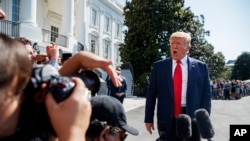The next round of trade talks between the United States and China might not happen, President Donald Trump told reporters Friday.
Asked by VOA if he would cancel the talks scheduled to be held in Washington, Trump replied, "Maybe," acknowledging the discussions are set for next month but "whether or not they're canceled, we'll see."
The president began a 30-minute question-and-answer session with journalists on the White House South Lawn by declaring, "We're not ready to make a deal" with China amid an escalating trade war, after the previous round of talks broke down in Shanghai last week.
"We have no choice but to do what we're doing," Trump said of two rounds of punitive tariffs he has imposed on China.
"As of this moment, they're having the worst year they've had in many, many years," he said of China.
"We have all the cards," he added.
Huawei
Trump was asked about reports his administration is going to delay granting licenses for American companies to restart sales to Chinese telecommunications giant Huawei. The president replied, "We're not doing business with Huawei," but that could change if there is a trade deal.
The Trump administration, in May, blacklisted Huawei, alleged to have deep ties to China's military, for national security concerns, preventing it from buying semiconductor chips made in the United States. But Trump last month agreed to give "timely license decisions," to allow companies such as Broadcom and Google to sell to Huawei.
The move to delay issuing those licenses came after Beijing announced it is halting the purchasing of American agricultural products in retaliation for Trump's new round of threatened tariffs. Beijing also allowed its currency to drop against the dollar to a level not seen in more than a decade.
A number of economists warn the trade war between the world's two biggest economic powers could hurt growth globally, in part due to disruption of supply chains and less efficient production.
The International Monetary Fund and the World Bank have downgraded their forecasts for economic growth this year.
Trump is calling for a weaker dollar and lower U.S. interest rates. He said on Friday the Federal Reserve should cut them by one percent, and has criticized China's currency moves.
However, he acknowledged to reporters as he departed the White House that the drop in the value of the yuan appears to be keeping the price of some Chinese exports from rising.
Trump has repeatedly promised that American consumers will not pay more for key goods and that the country's farmers, who sell the Chinese soybeans, pork and other agricultural products, will not be hurt by the trade war.






